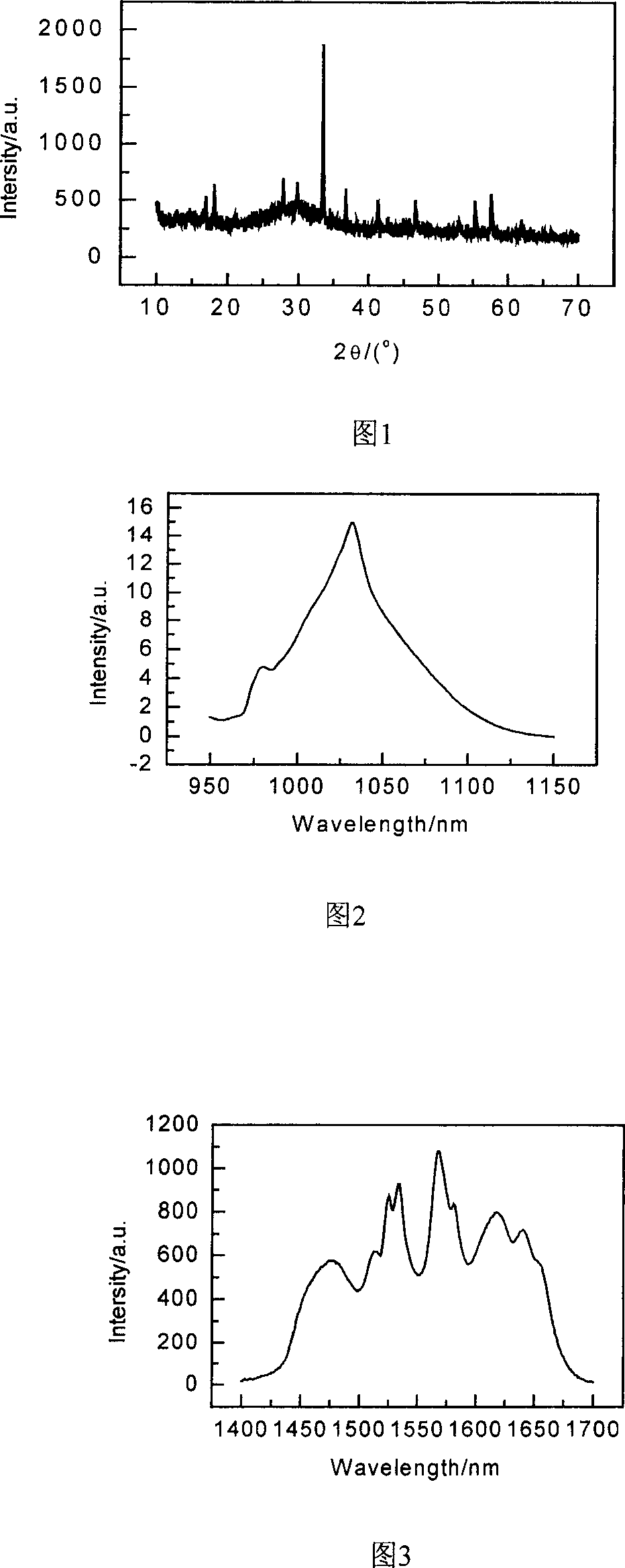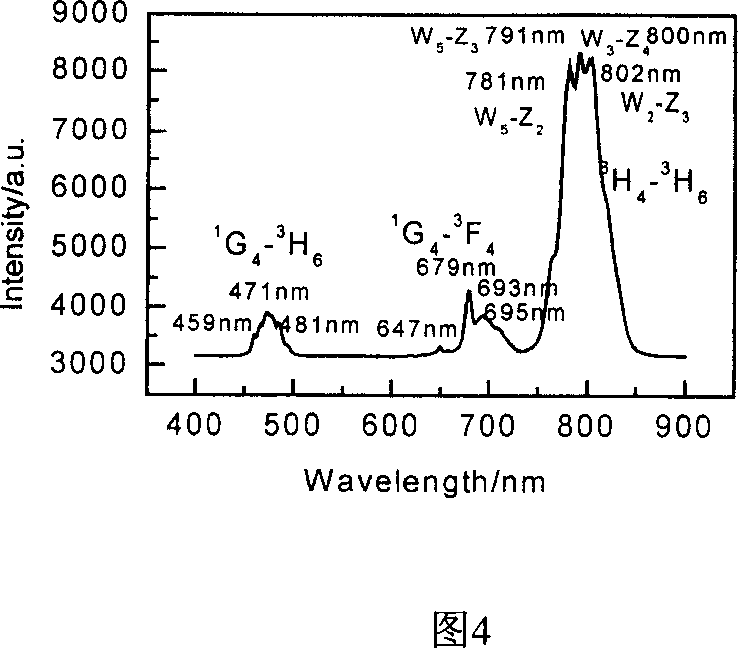Rare earth ion doped YAG micro crystalline glass and its preparation method
A technology of glass ceramics and rare earth ions, which is applied in the field of glass ceramics doped with rare earth ions, can solve the problems of thermal conductivity, difficult repetition times of laser oscillation threshold, difficult increase of laser output power, complex process, etc., and achieve good physical and laser characteristics, low cost, and simple material preparation methods
- Summary
- Abstract
- Description
- Claims
- Application Information
AI Technical Summary
Problems solved by technology
Method used
Image
Examples
Embodiment 1
[0025] Embodiment 1: Table 1 shows the glass formula and the first crystallization temperature value of Embodiment 1.
[0026] Table 1
[0027] raw material
CaO
Y 2 o 3
Al 2 o 3
SiO 2
Yb 2 o 3
Component (mol%)
39
8
16
36
1
glass transparent case
transparent
The first crystallization temperature (°C)
1050
[0028] The specific preparation process is as follows: in the first step, weigh 50 grams of pure raw materials for analysis according to the formula in Table 1, mix the raw materials evenly and pour them into a quartz crucible for melting. Put it into a cast iron mold, then place it in a muffle furnace for annealing, keep it at the glass transition temperature Tg for 2 hours, then cool it down to 50°C at a rate of 10°C / hour, turn off the power of the muffle furnace and automatically cool it down to room temperature, and take out the glass In the second step, a...
Embodiment 2
[0030] Embodiment 2: Table 2 shows the glass formula and the first crystallization temperature value of Embodiment 2.
[0031] Table 2
[0032] raw material
CaO
Y 2 o 3
Al 2 o 3
SiO 2
TiO 2
Yb 2 o 3
ErO 3
components
29
6.5
16
41
5
2
0.5
glass transparent case
transparent
The first crystallization temperature (°C)
1030
[0033] The specific preparation process is as follows: first step, weigh 50 grams of analytical pure raw materials according to the formula in Table 2, mix the raw materials evenly and pour them into a platinum crucible for melting, the melting temperature is 1800 ° C, keep warm for 1 hour, pour the glass melt into Put it in a cast iron mold, then place it in a muffle furnace for annealing, keep it at the glass transition temperature Tg for 1 hour, then cool it down to 50°C at a rate of 10°C / hour, turn off the power of the muff...
Embodiment 3
[0035] Embodiment 3: Table 3 shows the glass formula and the first crystallization temperature value of Embodiment 3.
[0036] table 3
[0037] raw material
CaO
Y 2 o 3
Al 2 o 3
SiO 2
TiO 2
Yb 2 o 3
T m 2 o 3
components
24
6.75
16
46
5
2
0.25
glass transparent case
transparent
The first crystallization temperature (°C)
1025℃
[0038] The specific preparation process is as follows: first step, weigh 50 grams of pure raw materials for analysis according to the formula in Table 3, mix the raw materials evenly and pour them into a platinum crucible for melting. Put it in a cast iron mold, then place it in a muffle furnace for annealing, keep it at the glass transition temperature Tg for 1 hour, then cool it down to 50°C at a rate of 10°C / hour, turn off the power of the muffle furnace and automatically cool it down to room temperature, and take ...
PUM
 Login to View More
Login to View More Abstract
Description
Claims
Application Information
 Login to View More
Login to View More - R&D
- Intellectual Property
- Life Sciences
- Materials
- Tech Scout
- Unparalleled Data Quality
- Higher Quality Content
- 60% Fewer Hallucinations
Browse by: Latest US Patents, China's latest patents, Technical Efficacy Thesaurus, Application Domain, Technology Topic, Popular Technical Reports.
© 2025 PatSnap. All rights reserved.Legal|Privacy policy|Modern Slavery Act Transparency Statement|Sitemap|About US| Contact US: help@patsnap.com


